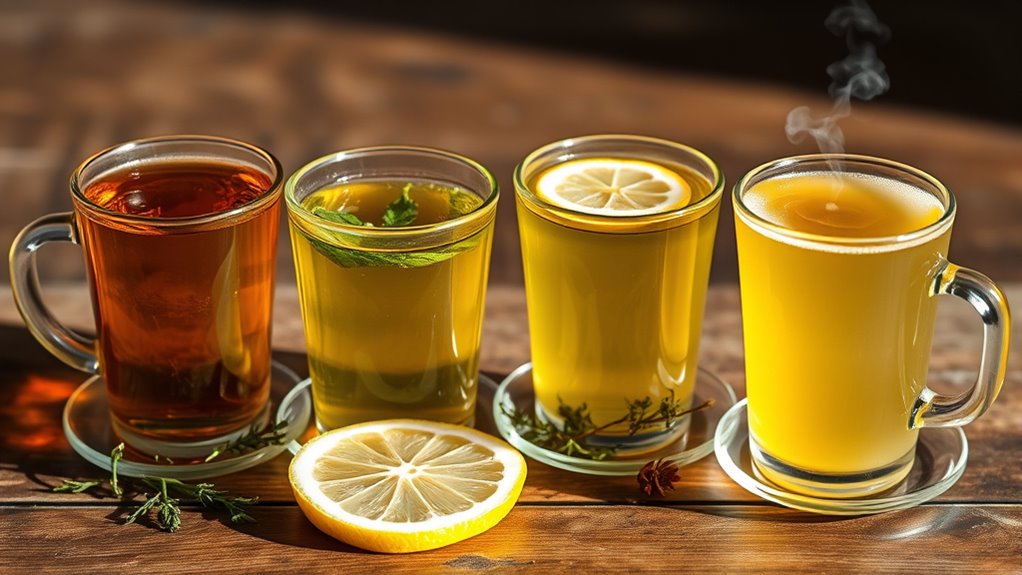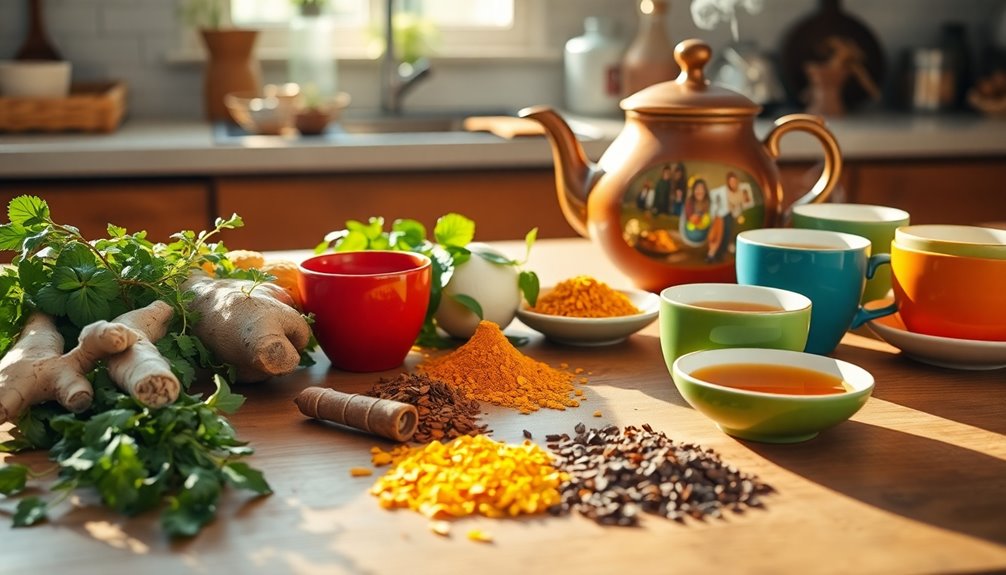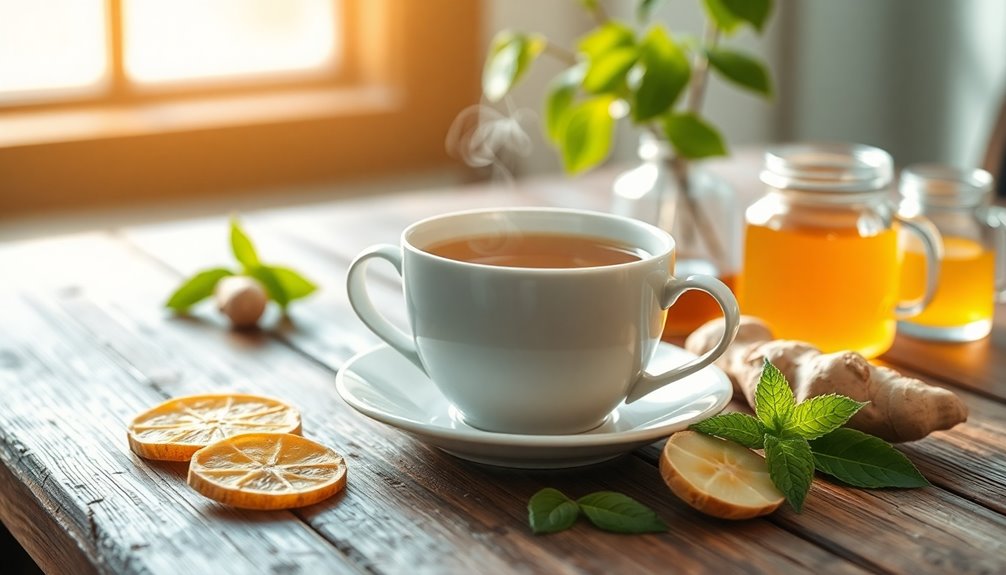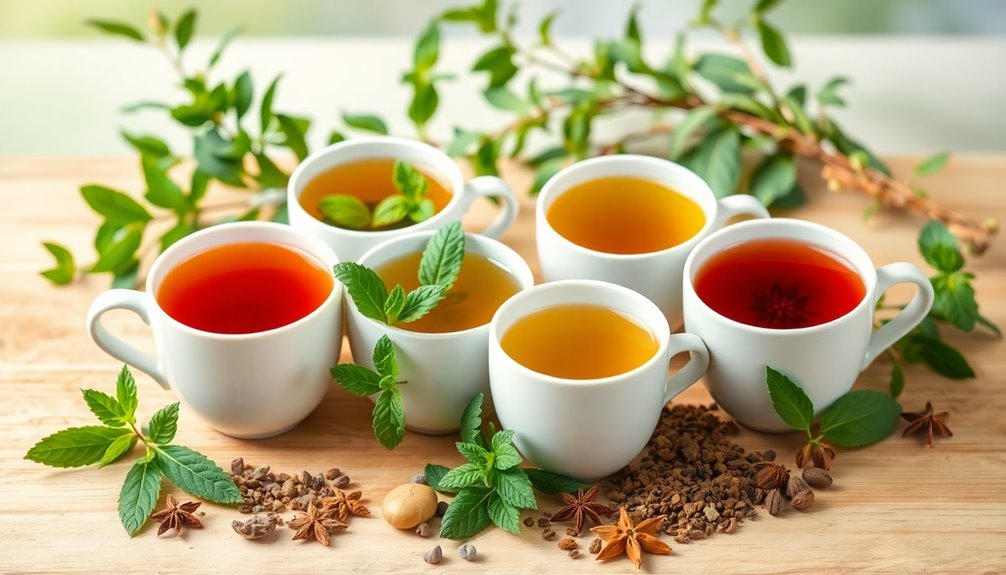When comparing teas for digestive health, herbal options like peppermint, ginger, chamomile, and fennel naturally soothe your stomach, reduce bloating, and ease discomfort without caffeine. Caffeinated teas like black and green can boost antioxidants but may cause acid reflux or stomach upset if consumed in excess. Choosing the right tea depends on your sensitivity and timing—herbal teas are great before or after meals, while moderation is key with caffeinated versions. Keep exploring to find the best fit for your digestion.
Key Takeaways
- Herbal teas like peppermint, ginger, chamomile, and fennel naturally soothe digestion and reduce bloating, gas, and inflammation.
- Caffeinated teas (black, green) offer antioxidants but may cause acid reflux or upset stomach if consumed excessively.
- Decaffeinated herbal blends provide digestive relief without caffeine-related side effects, suitable for sensitive individuals.
- Timing matters; herbal teas can be consumed before or after meals, while caffeine should be avoided in the evening to prevent sleep issues.
- Personal responses vary; choosing between herbal and caffeinated teas depends on individual sensitivities and specific digestive needs.

Ever wondered which tea best supports your digestive health? Many people turn to herbal blends for relief, but understanding their effects can help you make the right choice. Herbal teas, like peppermint, ginger, chamomile, and fennel, are popular because they’re naturally soothing and can ease digestive discomfort. These blends often contain specific herbs known for their calming effects on the stomach, reducing bloating, indigestion, and nausea. Peppermint tea, for instance, relaxes the muscles in your gastrointestinal tract, helping to relieve symptoms of irritable bowel syndrome and indigestion. Ginger tea can stimulate digestion and reduce nausea, making it a go-to for upset stomachs. Chamomile offers anti-inflammatory properties that soothe inflammation in the gut, while fennel helps reduce gas and bloating. Incorporating a variety of these herbs can provide a more comprehensive approach to supporting digestive health.
While herbal blends focus on natural remedies, it’s vital to contemplate caffeine effects if you’re choosing teas that contain caffeine. Many traditional teas, like black and green tea, contain caffeine, which can impact digestion in different ways. Moderate caffeine intake may boost alertness and provide antioxidants, but excessive consumption can lead to acid reflux, stomach upset, or increased bowel movements. If you’re sensitive to caffeine, you might want to limit your intake or opt for herbal alternatives. On the other hand, some teas labeled as decaffeinated still retain beneficial compounds that support digestion without the jitters or acidity associated with caffeine.
You should also think about timing when drinking tea. Herbal blends are usually safe to enjoy before or after meals, as they tend to support digestion without interfering with nutrient absorption. If you’re sensitive to caffeine, avoiding it in the evening can help prevent sleep disturbances and acid reflux at night. Conversely, a cup of herbal tea after a meal can help relax your stomach muscles and promote smooth digestion. Always check the ingredients of herbal blends to ensure they don’t contain additives or herbs that might cause allergies or adverse reactions. Additionally, paying attention to food safety practices when preparing herbal teas can prevent contamination and ensure optimal health benefits.
Understanding the differences between herbal blends and caffeinated teas allows you to tailor your choices to your digestive needs. Herbal teas offer a caffeine-free route that can soothe your stomach, while caffeinated teas may provide additional antioxidants but should be consumed mindfully. By paying attention to how each type of tea affects your body, you can develop a personalized routine that keeps your digestive system happy and healthy. Ultimately, the right tea can become a comforting part of your daily wellness regimen, supporting your digestion naturally and effectively.
Frequently Asked Questions
Which Tea Is Best for Acid Reflux Relief?
You should try ginger or chamomile tea for acid reflux relief. Ginger offers anti-inflammatory benefits and can soothe your stomach, while chamomile helps reduce irritation and relaxes your digestive muscles. Both tea varieties provide herbal benefits that can ease your symptoms. Drink these teas after meals or whenever you experience discomfort, but avoid caffeinated options. Incorporating these herbal teas into your routine may improve your digestive health and reduce acid reflux.
Can Tea Help With Bloating After Meals?
They say, “An ounce of prevention is worth a pound of cure,” so drinking herbal infusions can help with bloating after meals. You might find ginger or peppermint teas effective, as they soothe your digestive system. Just be mindful of caffeine effects—some teas, like black or green, may cause bloating or discomfort if consumed in excess. Stick to caffeine-free options for gentle relief and enjoy your meal without worry.
Are Herbal Teas Safe for Long-Term Digestive Health?
Herbal tea safety is generally good for long-term digestion, but it’s wise to enjoy them in moderation. Some herbs may cause adverse effects if consumed excessively over time. You should pay attention to how your body responds and consult a healthcare professional if you notice any issues. Long-term digestion effects vary depending on the herbs, so choose teas that support your health and avoid those that might cause irritation or other problems.
Do Different Teas Work Better for Diarrhea Versus Constipation?
Sure, some teas are secretly plotting to tackle your bathroom battles. For diarrhea, opt for gentler teas like peppermint or chamomile—they’ve got the right herbal combinations to soothe your gut. If constipation‘s the villain, go for senna or ginger, which are more potent in stimulating movement. Remember, the tea potency varies, so pick your herbal combo wisely to turn your digestive chaos into calm.
How Much Tea Should I Drink Daily for Digestive Benefits?
You should aim for 2 to 3 cups of tea daily to enjoy digestive benefits. Keep the tea caffeine content moderate to avoid disrupting your stomach, and drink it warm rather than hot to prevent irritation. Sipping at a comfortable tea temperature helps soothe your digestive system. Remember, listen to your body and adjust your intake if you notice any discomfort or sensitivity to caffeine or temperature.
Conclusion
When choosing a tea for digestive health, consider how each offers comfort, relief, and support. Whether you prefer the gentle warmth of ginger, the soothing calm of chamomile, or the invigorating zest of peppermint, each tea serves a purpose. Embrace the variety, enjoy the ritual, and listen to your body’s response. With these teas, you can soothe, relax, and restore your digestive harmony—because your gut deserves the best, every time.










